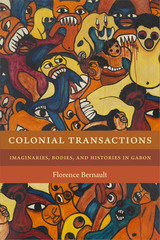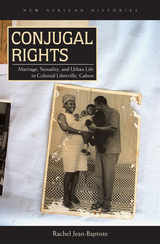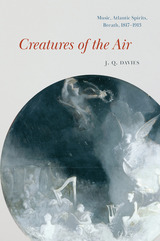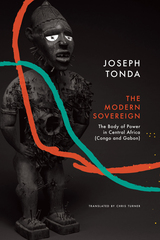4 books about Gabon

Colonial Transactions
Imaginaries, Bodies, and Histories in Gabon
Florence Bernault
Duke University Press, 2019
In Colonial Transactions Florence Bernault moves beyond the racial divide that dominates colonial studies of Africa. Instead, she illuminates the strange and frightening imaginaries that colonizers and colonized shared on the ground. Bernault looks at Gabon from the late nineteenth century to the present, historicizing the most vivid imaginations and modes of power in Africa today: French obsessions with cannibals, the emergence of vampires and witches in the Gabonese imaginary, and the use of human organs for fetishes. Struggling over objects, bodies, agency, and values, colonizers and colonized entered relations that are better conceptualized as "transactions." Together they also shared an awareness of how the colonial situation broke down moral orders and forced people to use the evil side of power. This foreshadowed the ways in which people exercise agency in contemporary Africa, as well as the proliferation of magical fears and witchcraft anxieties in present-day Gabon. Overturning theories of colonial and postcolonial nativism, this book is essential reading for historians and anthropologists of witchcraft, power, value, and the body.
[more]

Conjugal Rights
Marriage, Sexuality, and Urban Life in Colonial Libreville, Gabon
Rachel Jean-Baptiste
Ohio University Press, 2014
Conjugal Rights is a history of the role of marriage and other arrangements between men and women in Libreville, Gabon, during the French colonial era, from the mid–nineteenth century through 1960. Conventional historiography has depicted women as few in number and of limited influence in African colonial towns, but this book demonstrates that a sexual economy of emotional, social, legal, and physical relationships between men and women indelibly shaped urban life. Bridewealth became a motor of African economic activity, as men and women promised, earned, borrowed, transferred, and absconded with money to facilitate interpersonal relationships. Colonial rule increased the fluidity of customary marriage law, as chiefs and colonial civil servants presided over multiple courts, and city residents strategically chose the legal arena in which to arbitrate a conjugal-sexual conflict. Sexual and domestic relationships with European men allowed some African women to achieve a greater degree of economic and social mobility. An eventual decline of marriage rates resulted in new sexual mores, as women and men sought to rebalance the roles of pleasure, respectability, and legality in having sex outside of kin-sanctioned marriage. Rachel Jean-Baptiste expands the discourse on sexuality in Africa and challenges conventional understandings of urban history beyond the study of the built environment. Marriage and sexual relations determined how people defined themselves as urbanites and shaped the shifting physical landscape of Libreville. Conjugal Rights takes a fresh look at questions of the historical construction of race and ethnicity. Despite the efforts of the French colonial government and society to enforce boundaries between black and white, interracial sexual and domestic relationships persisted. Black and métisse women gained economic and social capital from these relationships, allowing some measure of freedom in the colonial capital city.
[more]

Creatures of the Air
Music, Atlantic Spirits, Breath, 1817–1913
J. Q. Davies
University of Chicago Press, 2023
An account of nineteenth-century music in Atlantic worlds told through the history of the art’s elemental medium, the air.
Often experienced as universal and incorporeal, music seems an innocent art form. The air, the very medium by which music constitutes itself, shares with music a claim to invisibility. In Creatures of the Air, J. Q. Davies interrogates these claims, tracing the history of music’s elemental media system in nineteenth-century Atlantic worlds. He posits that air is a poetic domain, and music is an art of that domain.
From West Central African ngombi harps to the European J. S. Bach revival, music expressed elemental truths in the nineteenth century. Creatures of the Air tells these truths through stories about suffocation and breathing, architecture and environmental design, climate strife, and racial turmoil. Contributing to elemental media studies, the energy humanities, and colonial histories, Davies shows how music, no longer just an innocent luxury, is implicated in the struggle for control over air as a precious natural resource. What emerges is a complex political ecology of the global nineteenth century and beyond.
Often experienced as universal and incorporeal, music seems an innocent art form. The air, the very medium by which music constitutes itself, shares with music a claim to invisibility. In Creatures of the Air, J. Q. Davies interrogates these claims, tracing the history of music’s elemental media system in nineteenth-century Atlantic worlds. He posits that air is a poetic domain, and music is an art of that domain.
From West Central African ngombi harps to the European J. S. Bach revival, music expressed elemental truths in the nineteenth century. Creatures of the Air tells these truths through stories about suffocation and breathing, architecture and environmental design, climate strife, and racial turmoil. Contributing to elemental media studies, the energy humanities, and colonial histories, Davies shows how music, no longer just an innocent luxury, is implicated in the struggle for control over air as a precious natural resource. What emerges is a complex political ecology of the global nineteenth century and beyond.
[more]

Modern Sovereign
The Body of Power in Central Africa (Congo and Gabon)
Joseph Tonda
Seagull Books, 2020
The “Modern Sovereign,” a notion indebted both to Hobbes’s Leviathan and Marx’s conception of capital, refers to the power that governed the African multitudes from the earliest colonial days to the post-colonial era. It is an internalized power, responsible for the multiform violence exerted on bodies and imaginations. Joseph Tonda contends that in Central Africa—and particularly in Gabon and the Congo—the body is at the heart of political, religious, sexual, economic, and ritual power. This, he argues, is confirmed by the strong link between corporeal and political matters, and by the ostentatious display of bodies in African life. The body of power asserts itself as both matter and spirit, and it incorporates the seductive force of money, commodities, sex, and knowledge. Tonda’s incisive analysis reveals how this sovereign power is a social relation, historically constituted by the violence of the African cultural Imaginary and the realities of State, Market, and Church. It is to be understood, he asserts, through a generalized theory economic, political, and religious fetishism. By introducing this crucial critical voice from contemporary Africa into the English language, The Modern Sovereign makes a significant contribution to field of anthropology, political science, and African studies.
[more]
READERS
Browse our collection.
PUBLISHERS
See BiblioVault's publisher services.
STUDENT SERVICES
Files for college accessibility offices.
UChicago Accessibility Resources
home | accessibility | search | about | contact us
BiblioVault ® 2001 - 2024
The University of Chicago Press









